Fairtrade Products in University Sports! A Local Project Promoting Social Sustainability in an International Context
Presentation of the project "Fairtrade Products in University Sports" during the FUturist Awarding on June 8, 2022.
About the Idea
The Central University Sports Department at the Free University of Berlin offers a diverse range of sports, workshops, and sports trips, along with a differentiated program in the field of health and foundation, as well as service and advisory services for university members.
Considering the university's mission statement and based on the agreement for university sports, we design a comprehensive and high-quality course offering every semester, encompassing more than 120 sports and up to 800 individual events per semester. We see ourselves as providers of broad-spectrum content suitable for discovering various sports, finding one's own lifetime sport, and serving a healthy life balance. But also, competitive sports at various levels, as one of the central motives for sports, are realized in various forms.
University sports provide a special opportunity for intercultural exchange and thus contribute significantly to the open and integrative culture at the Free University of Berlin. Under the motto "moving campus," we aim to promote the well-being of all members of the Free University and encourage lifelong sports activities.
Description of the Situation
The major team sports (basketball, football, handball, and volleyball) consistently attract a large number of participants in university sports and are a significant part of the course offerings of the Central University Sports Department. These team sports also drive intercultural exchange and an open and integrative culture at the Free University of Berlin.
Every year, many balls are needed for the major team sports to carry out the courses and compensate for everyday wear and tear. The required products are purchased under the given procurement guidelines of the central purchasing department of the FU, which follows the principles of efficiency and thriftiness. Therefore, mainly inexpensive products are purchased, which are not necessarily classified as sustainable.
The International Context
The relevant reports on the production conditions in the sports goods industry are widely known. Many balls are handmade, often with long working hours and poor working conditions. Handmade footballs are predominantly produced in Pakistan, especially in the northern and impoverished region around Sialkot. Up to 60 million balls are produced there for the Football World Cup. In total, about 40,000 people in Pakistan are employed in the ball industry. Seamstresses often earn only a fraction of the legal minimum wage. Families become impoverished, and as a result, children have to work to ensure sufficient income for the family.
By purchasing sports balls with the Fairtrade label, seamstresses and workers get better working conditions for their painstaking work. For the football-producing industry, the Fairtrade Hired Labour Standard applies, which requires that workers receive at least the national minimum wage. Additionally, the Fairtrade standards require continuous improvement of working conditions and wages.
Particularly, women benefit from Fairtrade standards. The standards prohibit the discrimination of women and mandate that employers must ensure that working conditions in factories or sewing centers are specifically appropriate for the needs of women. Exploitative child labor is also prohibited.
The Fairtrade premium allows employees to invest in joint projects that improve the living and working conditions of people on-site. In Sialkot, workers have invested the premium in buses to safely transport workers to and from the factory. Moreover, books and school bags for children were purchased, and drinking water systems were established.
As new balls in the relevant sports are continually needed in university sports, the project idea can start implementing with the next ball order.
Conclusion and outlook
In July 2022, the first 15 Fairtrade handballs were ordered for use in courses. These were added to the existing set of balls, with older balls that were still in good working order remaining in use, of course. In addition, since the 2022/23 winter semester, all those interested in handball have been informed about the use of Fairtrade handballs in the course description for handball courses.
We were in contact with sporting goods retailers and wholesalers, who promised us new sustainable products for basketball and beach volleyball from various companies. Unfortunately, however, we found that not all sustainably produced balls are of sufficient quality for demanding sports. As this quality is very important to us and is also demanded by our participants and course instructors, we feel obliged to continuously seek solutions together with suppliers and course participants.
For our sports courses, we have purchased sustainably produced Fairtrade soccer balls, handballs, and durable tennis balls without plastic packaging for the period 2022-24.
In April 2024, we invited course instructors to discuss sustainability. At the meeting with university sports course instructors, they learned about sustainability in university sports at three different workshop tables. Loredana Zafisambondaoky from FC Internationale, Germany's first sustainably certified amateur club, was also a guest. The topics covered included:
1. Procurement & upcycling: Alternatives to disposing of worn-out sports equipment.
2. Public relations: Sustainable communication channels for greater visibility.
3. Diversity & inclusion: Strategies for an inclusive sports culture.
The results were incorporated into our daily work, and we regularly review the feasibility of suggestions such as a swap meet for sportswear.
It is a challenge to communicate the topic within the diverse tasks and areas of work of university sports, to attract attention, and to get people talking. Many organizational and content-related issues overshadow the topic.
The project idea will continue to guide our daily activities and forms part of a holistic, sustainable approach to the organization and implementation of measures in university sports at the FU Berlin.
Contact: Alexander Scholl, alexander.scholl@fu-berlin.de, (030) 838 71920




